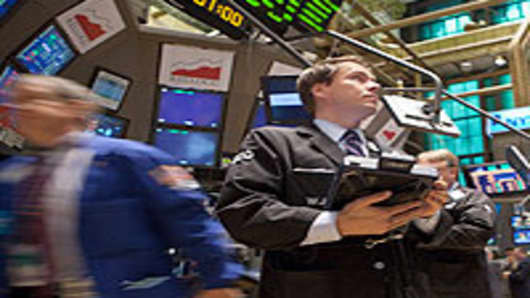As the market crosses the final recovery frontier into positive jobs creation, the only question that seems left is how strong the gains in the economy and stocks will be.
Friday's government report indicating the economy created 162,000 jobs in Marchlifted investor spirits as the market continues its stairstep-climb higher toward Dow 11,000 and beyond.
Even some of the market's most doubting minds conceded that with the employment hurdle crossed, the market's momentum would be hard to stop.
"We may get a correction this spring but the bull market will resume," University of Maryland economist Peter Morici wrote in his morning note. "Quite simply, Goldilocks has come to roost on Wall Street. The Dow is headed for 12,000 by yearend."
The "Goldilocks" reference is a metaphor for an economy that is not too hot or too cold, but rather just right for sustainability. That the government created about 25 percent of the new jobs through Census hiring suggests that the economy indeed is at a rapid simmer rather than a full boil.
The market reacted in predictable fashion Monday, after having the Good Friday holiday, during which markets were closed, and Easter weekend to digest the report.
The market rallied, but only modestlyas investors continue to take a cautious tack about just how robust the recovery will be.
"Essentially a lot of this news that is coming out now about the job market's trajectory being up is baked in the cake in the stock market," said Michael Cohn, chief investment strategist at Global Arena Investment Management in New York. "The bond market is taking it a bit harder than the stock market in general, but that's not a bad thing."
Indeed, the benchmark 10-year Treasury note's yield traded at just a hair under 4 percent, considered at this point a fairly important psychological threshold. The level represents at once the lack of a safety bid as well as renewed competition for stocks as the return on government debt turns higher.
Despite some fears that stocks face an overbought situation in addition to a threat from higher Treasury yields, the direction was clearly up for equities as the economy defies bearish predictions of a double-dip.
Dennis Gartman, author of "The Gartman Letter" investor guide, said the employment trends are reinforcing beliefs that the economic recovery is strong—perhaps stronger than expected.
"These are good bits of news, and although some will almost certainly denigrate the data as being 'insufficiently' strong...we shall simply suggest that they are trying to force their own long-held opinions on the weakness of the US economy upon the data," he wrote.
"They've been wrong thus far and they are wrong still to deny that things are getting better economically. Things are getting better, and that's that."
The difference as far as stocks go could be less of a correlation between sectors.
Whereas in 2008 stocks fell uniformly and in 2009 the opposite happened, 2010 looks to be a year when certain areas will clearly outperform others, at least as suggested by first-quarter results. Industrials (13.1 percent), financials (11.85 percent) and consumer discretionary (10.8 percent) were at the top end of the Standard & Poor's 500 spectrum, while telecom (-4.8 percent) and utilities (-3.4 percent) were at the disparate other end.
"We think 2010 is going to be about being more opportunistic about positions—not just buying things when they're down but also selling stocks when they're richly valued," said Gary Flam, portfolio manager at Bel Air Investment Advisors in Los Angeles. "It's going to be more about moderating our positions to make sure we have more attractive risk ratios going forward in all our positions."
Rising commodity prices could be another headwind for stocks as oil in particular surges past the $85 a barrel mark, posing dangers to consumers through higher gas prices, while investors look for diversification through assets that are not tied to the movement of stock prices.
"More and more people are looking for non-correlated asset classes," said Nadav Baum, executive vice president at BPU Investment Management in Pittsburgh. "When you're talking about investing, fundamentally you should have a piece of the commodity world as an asset allocation piece."
Yet the improving employment picture also could be the classic case of the rising tide lifting all boats; both stocks and commodities posted gains in Monday trading as investors seemed content to simply keep buying.
"The lengthening of the factory work week, the continued boom in temps—that suggests there will be a much faster step up in hiring than what we've seen," Joe Lavorgna, chief US economist at Deutsche Bank, told CNBC. "We actually think the recovery is really proceeding along quite nicely."
Yet naysers remained: Gluskin Sheff economist David Rosenberg called the market movement "an extremely whippy rally," and warned investors against "uncorking the champagne bottles because of the headline job figure..."
"These are tumultuous and volatile times and investors should resist the temptation of becoming too bearish at the lows and too dogmatically bullish at the highs," Rosenberg wrote in his morning note. "Memories of the bull market in 2007 and the debt explosion that took us to the parabolic peak should not be lost on today’s investor."



